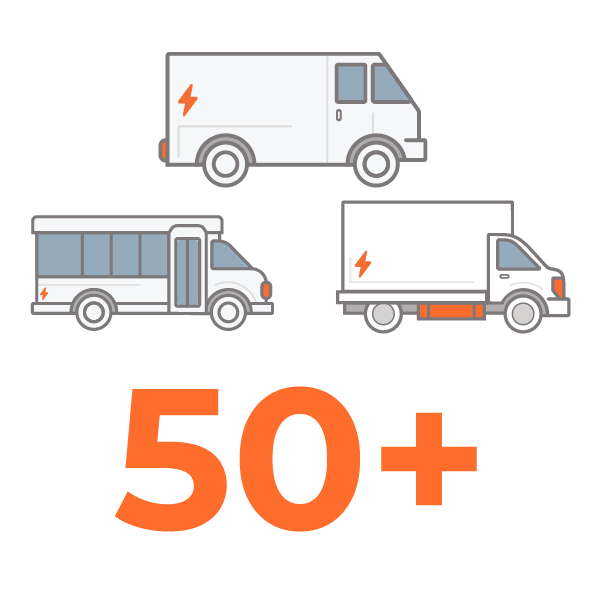Act Now: Advanced Clean Fleets Rule is Live in California
Here's What You Need to Know
The Advanced Clean Fleet (ACF) Rule, passed by the State of California, was designed to gradually convert medium and heavy duty fleets to zero-emission by 2035.
ACF is expected to save fleet owners $48 billion in operating costs while generating $26.6 billion in health savings from tailpipe emissions related illnesses through 2050.

WHO THE ACF AFFECTS:
High Priority Fleets
with box trucks, vans, buses with two axles, and light-duty package vehicles.
Federal Agencies
with at least one vehicle in California. Certain counties and agencies with fewer than 10 vehicles may be exempt from ACF.

Vehicles If you own, operate, or direct a fleet of 50 or more vehicles with a least one vehicle in California




COMPLIANCE REQUIREMENTS
HIGH PRIORITY FLEETS
Option 1: New EVs
- Beginning January 1, 2024, any new truck your fleet purchases must be a zero-emission vehicle
- Internal Combustion Engine (ICE) vehicles must be retired when they have been in use for 18 years or have traveled more than 800,000 miles, whichever comes first
- No ICE truck purchases are allowed
HIGH PRIORITY FLEETS
Option 2: Incremental EV Milestones
- Your fleet must meet specific EV/ICE vehicle composition targets based on vehicle size and model year
- Fleets can continue to add ICE vehicles as long as they meet incremental EV targets
YEAR
% of fleet vehicles that must be zero emission
2025
10%
2028
25%
2031
50%
2033
75%
2035+
100%
FEDERAL AGENCIES
New EVs
- 50% of new truck purchases between 2024 and 2026 must be EVs
- 100% of new truck purchases from after 2026 must be EVs
- Counties and agencies with fewer than 10 vehicles may qualify for exemption
Extensions and Exemptions
Delays outside of the fleet's control can happen and extensions and exemptions may be granted. Some examples of exemptions are listed below. You can find the whole list and more information here.
Have questions about extension and exemptions to the ACF? Motiv policy experts can help.
Extension and Exemption Examples
Charging Infrastructure (EVSE) Delays
If a fleet begins planning to comply with ACF but construction may delay compliance, fleet may apply for a one year extension
Electrical Delays
If a utility needs more time to make necessary electrical upgrades, the fleet may delay adoption.
Fleet owner must submit documentation and use the electrical load that can be supplied by the utility. All electrical extensions end in 2030.
Vehicle Delivery Delays
If a fleet purchases an EV but there are delays to delivery, the fleet may receive an extension and continue to use an ICE vehicle until EV is received.
Daily Usage Exemptions
If a fleet can prove that available EV models do not meet their operational requirements, fleet may receive exemption
What Should I Do Now?
- Assess your fleet composition, budget, and procurement plans
- Decide which compliance option is right for you
- Get started today, including EV procurement and EVSE upgrades
Are there Available Incentives?
Funding is available across California for both EV procurement and EVSE, in addition to federal tax and LCFS credits. Motiv can help you source and apply for funding programs applicable to your fleet.
Is ACF Limited to California?
The following states have started to adopt ACF or are considering adoption, with more to come:
- Connecticut
- Delaware
- Maine
- Maryland
- Massachusetts
- New Jersey
- New Mexico
- New York
- Oregon
- Pennsylvania
- Rhode Island
- Vermont
- Washington
- Washington D.C.